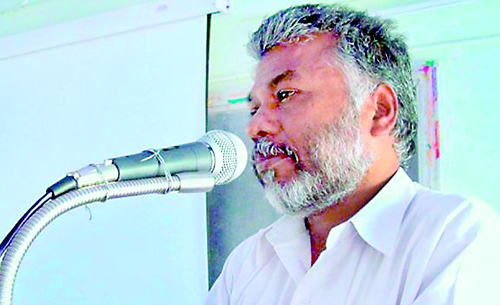Sunday Times 2
Why Indian author Perumal Murugan quit writing
“Perumal Murugan, the writer is dead. As he is no God, he is not going to resurrect himself. He has no faith in rebirth. As an ordinary teacher, he will live as P Murugan. Leave him alone.”

Perumal Murugan is one of the finest writers in the Tamil language
With these dramatic words on his Facebook page, the well-known writer in the Tamil language announced his decision to give up writing forever. The provocation: wrathful protests against his novel Madhorubhagan by local Hindu and caste-based groups.
Murugan also asked his publishers not to print and sell his work and promised to compensate them for the unsold books. He implored his readers to burn his books, and said he would stop attending literary festivals.
Madhorubhagan, first published in 2010, is set a century ago, It’s a gripping fictional account of a poor, childless couple, and how the wife, who wants to conceive, takes part in an ancient Hindu chariot festival where, on one night, consensual sex between any man and woman is allowed. Murugan explores the tyranny of caste and pathologies of a community in tearing the couple apart and destroying their marriage.
There is “no historical evidence”, says the writer, that such a mating ritual ever existed and only stories about it were passed on orally. The temple has 11 festivals every year and the chariot festival seems to be still continuing, going by the temple website pictures.
Murugan says in the book that during his research he found people who were referred to as “god-given child” and “god’s child”. He writes: “I had presumed that they were called so simply because they had been born after prayers to the god. But during my search I chanced upon the connection between the temple festival and god’s children.”
One critic said the novel “lays bare with unsparing clarity a relationship caught between the dictates of social conventions and the tug of personal anxieties”. Fellow writers lauded Murugan’s stark and shocking imagery and his “sensitive portrait” of the couple. “Childless couples, especially the women in these marriages, suffer untold humiliation even today. If anything deserves to be banned, it is this control over women’s sexuality,” says Murugan’s translator Aniruddhan Vasudevan.
India has a long and chequered history of banning books – usually for allegedly offending religious and community sentiments, misrepresenting the country or perceived obscenity – but such a drastic reaction by a writer who has been clearly intimidated is unprecedented.
Things reportedly came to a head at a so-called “peace meeting” on Monday between Murugan and the groups opposed to him. The author has not spoken about the meeting – the groups had demanded that he offer an unconditional apology, delete the controversial portions, take back unsold copies and stop writing on “controversial subjects that hurt the sentiments of the people”.
It is also not entirely clear why the groups got worked up over a novel published in Tamil four years ago. Murugan reckons the English translation One Part Woman, which was published last year by Penguin, is probably the reason, and that “somebody who read it could have instigated the local organisations”. He believes caste groups, incensed by some characters in his novel, and pro-Hindu organisations ganged up to force his hand.
In December, the right-wing Hindu nationalist group Rashtriya Swayamsevak Sangh (RSS, National Volunteers’ Organisation) burnt copies of the book, prompting his publishers and writers to issue a strong statement that cultural vigilantes “have all too often bullied writers and publishers, attacking our fundamental rights and freedoms of speech and expression”.
None of the political parties – regional or national – have spoken in support of Murugan. Many say this conspiracy of silence among India’s political parties when it comes to freedom of speech bodes ill for the world’s largest democracy.
Murugan is one of the finest writers of his generation in the Tamil language. His novels are rooted in the western region of Tamil Nadu where he was born. His stories are peopled by characters caught up in the whirligig of maddening change, struggling peasants, a child bonded to work in an upper caste home to repay the loan taken by his father. He has been outspoken about the evil practice of caste discrimination. A vivid memoir recounts the experience of his farmer father running a soda stall in a cinema to keep the home fires burning. He’s “versatile, sensitive to history and conscious of his responsibilities as a writer”, says author and translator N Kalyan Raman in a glowing appraisal of Murugan’s work.
“The silencing of Perumal Murugan,” says historian Ramachandra Guha, “is a sad day for Tamil Nadu and for India.” He and others believe that if Murugan does not return to writing in India’s disturbing climate of increasing intolerance of freedom of speech, it will be a tragedy.
One newspaper sharply reminded that the “spirit of orthodoxy and heterodoxy have coexisted” in the Indian intellectual traditions from ancient times. An online petition is already drumming up support for Murugan’s right to free speech. “Right now Murugan does not need a pep talk,” says Vasudevan his translator. “Perhaps he should be allowed to feel the exhaustion while we speak, write, march and read. Hopefully, after allowing himself to fully feel the sadness and exhaustion, he will emerge.”
Courtesy BBC

